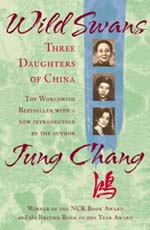
In vista del mio imminente viaggio in Cina, ho messo momentaneamente da parte la fantascienza sensazionalistica di "Wild Cards" per dedicarmi a libri sulla Cina, meglio se scritti da cinesi, sperando di capire meglio quello che visiterò.
Il primo è stato "Cigni selvatici. Tre figlie della Cina", un romanzo autobiografico del 1991 della scrittrice cinese Jung Chang, scritto originariamente in inglese, tradotto in 37 lingue, ma tuttora inedito in Cina a causa della censura.
I tre cigni del titolo le tre generazioni di donne cui l'autrice racconta la storia: sua nonna materna, sua madre e lei stessa, accomunate dall'ideogramma "cigno" nel nome. Il libro comincia negli anni '20 del 1900 e arriva fino agli anni '80, per cui copre il periodo di instabilità degli anni '20, l'occupazione giapponese, il successivo scontro fra le fazioni dei nazionalisti filoamericani di Chiang Kai-shek e dei comunisti di Mao Tse-tung con la vittoria di questi ultimi e le varie fasi della Repubblica Popolare Cinese: gli inizi, il disastroso Grande Balzo in Avanti, la Rivoluzione Culturale e le Guardie Rosse e la riapertura al mondo con Deng Xiaoping.
Lo stile è volutamente piatto, concreto. Bastano gli avvenimenti politici, che si intrecciano strettissimamente con la vita familiare delle protagoniste, a movimentare il racconto. Incontriamo la legatura dei piedi e la pratica del concubinato, varie repressioni, la fame e la ricchezza, amori difficili e parti complicati, tradizioni confuciane e propaganda maoista...
L'ho trovato un libro interessantissimo, difficile e appassionante, da cui ho fatto fatica a staccarmi e da cui ho imparato molto.
In view of my upcoming trip to China, I have temporarily left the sensationalist science fiction of "Wild Cards" to read books about China, better if written by Chinese, hoping to better understand what I will visit.
The first was "Wild Swans: Three Daughters of China", an 1991 autobiographical novel by Chinese writer Jung Chang, originally written in English, translated into 37 languages, but still unpublished in China because of the censorship.
The three swans of the title are the three generations of women the author tells about: her maternal grandmother, her mother and herself, linked by the "swan" ideogram in her name. The book begins in the 1920s and ends up in the 1980s, covering the period of instability of the 1920s, the Japanese occupation, the subsequent clash between the factions of Chiang Kai-shek's filoamerican nationalists and the Communists of Mao Tse-tung with the victory of the latter and the various phases of the People's Republic of China: the beginnings, the disastrous Great Leap Forward, the Cultural Revolution and the Red Guards, and the reopening to the world with Deng Xiaoping.
The style is deliberately matter-of-factly. The political events, which are closely intertwined with the family life of the protagonists, are more than enough to move the tale. We encounter feet bounding and concubinate, various repressions, hunger and wealth, difficult loves and complicated births, Confucian traditions and Maoist propaganda...
I found it a very interesting, difficult and exciting book, difficult to stop reading and from which I learned a lot.
L'ho trovato un libro interessantissimo, difficile e appassionante, da cui ho fatto fatica a staccarmi e da cui ho imparato molto.
In view of my upcoming trip to China, I have temporarily left the sensationalist science fiction of "Wild Cards" to read books about China, better if written by Chinese, hoping to better understand what I will visit.
The first was "Wild Swans: Three Daughters of China", an 1991 autobiographical novel by Chinese writer Jung Chang, originally written in English, translated into 37 languages, but still unpublished in China because of the censorship.
The three swans of the title are the three generations of women the author tells about: her maternal grandmother, her mother and herself, linked by the "swan" ideogram in her name. The book begins in the 1920s and ends up in the 1980s, covering the period of instability of the 1920s, the Japanese occupation, the subsequent clash between the factions of Chiang Kai-shek's filoamerican nationalists and the Communists of Mao Tse-tung with the victory of the latter and the various phases of the People's Republic of China: the beginnings, the disastrous Great Leap Forward, the Cultural Revolution and the Red Guards, and the reopening to the world with Deng Xiaoping.
The style is deliberately matter-of-factly. The political events, which are closely intertwined with the family life of the protagonists, are more than enough to move the tale. We encounter feet bounding and concubinate, various repressions, hunger and wealth, difficult loves and complicated births, Confucian traditions and Maoist propaganda...
I found it a very interesting, difficult and exciting book, difficult to stop reading and from which I learned a lot.

2 commenti:
è un libro che ho visto spesso in libreria ma dato che sembra impegnativo e io ho ancora un mare di altre cose da leggere, l'ho lasciato lì dov'era.. :S
In effetti a tratti è pesantuccio, più per i contenuti che per lo stile.
Posta un commento